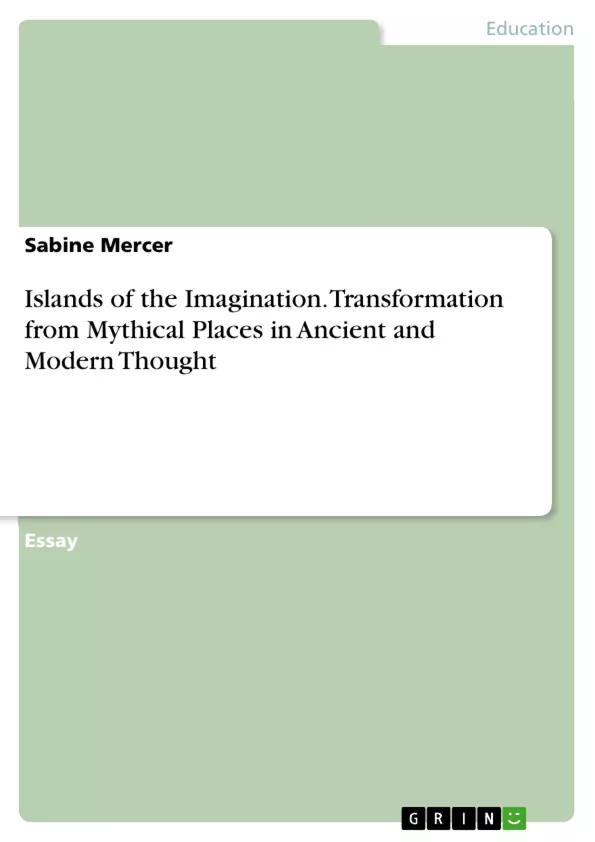The tradition of island imaginings in European thought existed long before explorers were actually able to reach far away islands and give first-hand accounts of their encounters and observations. Myths of islands are of an extreme age and deeply rooted in European culture, where they were subjected to ongoing transformation by writers of various periods in history. Story telling about islands stretches back thousands of years: from early island myths in antiquity, to explorers, poets and philosophers in the Age of Discovery; from idealizing nature and islanders, to islands that acted as vehicles for social criticism and reflection on social conditions in Europe.
The island setting was originally employed as a site and inspiration for spiritual, emotional, or psychological transformation, as a kind of incubator for the initiation and fostering of an individual’s growth. The specific workings of the archetypal place as an agent of change involved a morally challenging confrontation in a magical setting. Appropriate conduct and prudent behaviour opposite the unfamiliar, followed by the resolve of a potentially dangerous situation or conflict, enabled the shipwrecked to finally leave the island and return to their respective societies.
This essay provides a historical overview of the island tradition in European literature and links it specifically to the islands of the imagination where the writer travels behind or in front of his or her time envisaging a better world – utopias often take the form of a subversive analysis of contemporary society. Islands and island dwellers were often envisaged as superior versions of the countries and peoples who imagined them, an idea that survived and came to the fore in the positivist scientific and rationalist discourse of the Enlightenment. Island-stories are always set distant in time and place and the remoteness and finite dimensions of islands seemed perfect for constructing a compressed and complete universe, a miniature world, solely governed by the poet’s ideals and ideas.
Table of Contents
- INTRODUCTION
- Magic Islands: Loci for Transformation
- Anon: The Shipwrecked Sailor (ca 19th Century BC)
- William Shakespeare: The Tempest (1611)
- Ancient Utopias of Escape
- Hesiod: Works and Days (ca 700 BC)
- Plato: Critias or Atlanticus (ca 360 BC)
- Horace: "Epode XVI" (20 BC)
- Modern Utopias of Reconstruction
- Thomas More: Utopia (1516)
- Francis Bacon: The New Atlantis (1627)
- Utopian/Dystopian Reflections: Island Transformation in the Age of Discovery
- Antonio Pigafetta: Magellan's Voyage (1522 – 1525)
- Michel de Montaigne: " On the Cannibals" (1580)
Objectives and Key Themes
This essay provides a historical overview of the island tradition in European literature, specifically focusing on the islands of the imagination where writers envision a better world. It explores how these utopian imaginings often serve as a subversive analysis of contemporary society.
- The use of islands as sites for spiritual, emotional, or psychological transformation.
- The role of islands as a vehicle for social criticism and reflection on social conditions in Europe.
- The evolution of island imaginings from ancient myths to the Age of Discovery.
- The contrast between utopian and dystopian perspectives on island societies.
- The influence of explorers' accounts on the development of island narratives.
Chapter Summaries
The introduction sets the stage for the essay, highlighting the long-standing tradition of island imaginings in European thought. It explains how islands have been used as a setting for transformation, both personal and societal, and how they reflect the values and anxieties of different eras.
Chapter 2 delves into the concept of "Magic Islands" as loci for transformation. It examines two key texts: "The Shipwrecked Sailor" and Shakespeare's "The Tempest." These stories demonstrate how islands provide a space for moral challenges, cultural encounters, and eventual personal growth.
Keywords
The essay focuses on key themes such as island imaginings, utopian and dystopian perspectives, social criticism, transformation, exploration, and the influence of culture and history on literary representations.
- Arbeit zitieren
- Dr Sabine Mercer (Autor:in), 2004, Islands of the Imagination. Transformation from Mythical Places in Ancient and Modern Thought, München, GRIN Verlag, https://www.hausarbeiten.de/document/298742


